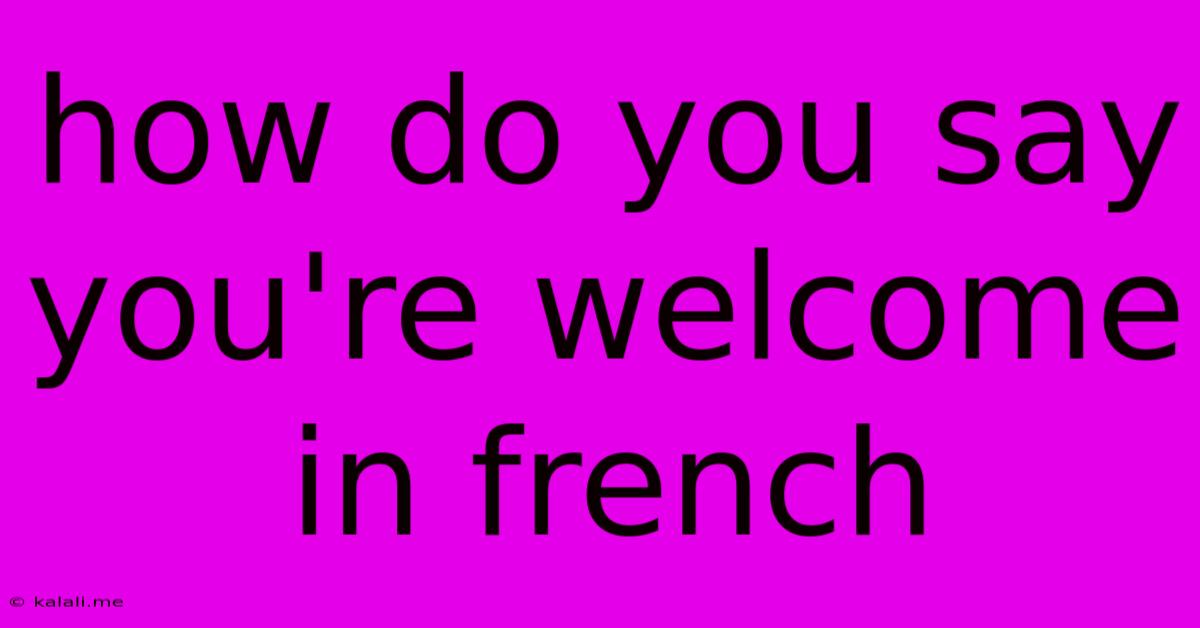How Do You Say You're Welcome In French
Kalali
May 25, 2025 · 3 min read

Table of Contents
How Do You Say "You're Welcome" in French? A Comprehensive Guide
So you've just helped someone out, and now you're wondering how to politely acknowledge their thanks in French. Knowing how to say "you're welcome" is crucial for mastering French conversation and showing good manners. This article will explore various ways to express "you're welcome" in French, depending on the context and level of formality. We'll delve into the nuances of each phrase and help you choose the most appropriate response for any situation.
The Most Common Ways to Say "You're Welcome" in French:
The most straightforward and commonly used phrase is "De rien." This literally translates to "from nothing," implying that the act of helping was insignificant. It's suitable for most casual conversations and is a safe bet in most situations.
- Example:
- Person A: "Merci beaucoup!" (Thank you very much!)
- Person B: "De rien." (You're welcome.)
Another popular and versatile option is "Il n'y a pas de quoi." This translates to "there's nothing to it" or "it's nothing at all." It's a slightly more formal and emphatic way of saying "you're welcome," conveying a sense of ease and minimizing the significance of your help.
- Example:
- Person A: "Merci pour votre aide." (Thank you for your help.)
- Person B: "Il n'y a pas de quoi." (You're welcome.)
More Formal and Expressive Alternatives:
For more formal settings or when you want to express greater appreciation for the thank you received, consider these options:
-
"Avec plaisir." This translates to "with pleasure" and conveys a warm and friendly tone, suggesting you were happy to help. It's perfect for situations where you genuinely enjoyed assisting the person.
-
"Je suis content(e) de vous avoir aidé(e)." This translates to "I'm happy to have helped you" (using content for male speakers and contente for female speakers). This is a more personal and heartfelt expression, showing genuine kindness and willingness to assist.
-
"C'est un plaisir." Similar to "avec plaisir," this translates to "it's a pleasure" and is a polite and graceful way to acknowledge thanks.
Situational Considerations:
The best way to say "you're welcome" in French will always depend on the context. Consider the following:
-
Formality: Use "de rien" or "il n'y a pas de quoi" in most casual settings. For more formal settings, opt for "avec plaisir," "c'est un plaisir," or "je suis content(e) de vous avoir aidé(e)."
-
Relationship with the person: If you have a close relationship with the person, a more informal phrase like "de rien" is perfectly acceptable. With acquaintances or strangers, a slightly more formal option might be more appropriate.
-
The nature of the help: If the help was significant or time-consuming, a more expressive phrase like "je suis content(e) de vous avoir aidé(e)" might be more fitting.
Mastering these different ways to say "you're welcome" in French will enhance your communication skills and leave a positive impression on those you interact with. Remember to choose the phrase that best suits the context and your relationship with the other person. Bon courage!
Latest Posts
Latest Posts
-
Does The Wii U Remote Work With The Wii
May 25, 2025
-
How To Delete Contacts Synced With Google Account
May 25, 2025
-
Aint No Fun When The Rabbit Got The Gun
May 25, 2025
-
Single Pole Switch On 3 Way
May 25, 2025
-
How To Repair Cinder Block Wall Cracks
May 25, 2025
Related Post
Thank you for visiting our website which covers about How Do You Say You're Welcome In French . We hope the information provided has been useful to you. Feel free to contact us if you have any questions or need further assistance. See you next time and don't miss to bookmark.